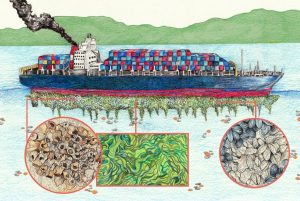
Vincent Toritseju
Lagos — The Nigerian Maritime Administration and Safety Agency, NIMASA, Monday issued a note of warning against threats to the country’s transition to Blue Economy if the issue of Biofouling is not tackled by coastal countries across the world.
Biofouling or biological fouling is the accumulation of microorganisms, plants, algae, or small animals that attaches themselves to vessels and are consequently transported and transferred over the world.
The species also move by clinging to submarine hulls, devices such as water inlets, pipe work, grates, ponds, and rivers that cause degradation to the environment.
Speaking at the opening International Maritime Organization, IMO, led regional workshop on Test Biofouling in Nigeria, NIMASA’S Director General, Dr. Bashir Jamoh said that if urgent steps are not taken to address the situation, it will bring about huge prevention and control cost.
Jamoh also said that Biofouling can also lead to food insecurity as this could also lead to social and economic impact.
He said: “Studies over time have however, revealed that ships serves as a channel of transportation of harmful non-indigenous Invasive Aquatic Species, IAS.
“These organisms attached themselves to the outer surface and niche area of a ship and are then translocated from eco-region to another.
“This issue of Biofouling has inevitably exposed nation to the threat of the IAS into our territorial waters. It is noteworthy that when these non-indigenous marine species are introduced into an eco-system, they possess the ability to outcompete the native ones, thereby threatening their existence, biodiversity and national food security resulting in huge social and economic impact.
“Furthermore, biofouling increases the hydrodynamic drag of ships which results in increased fuel consumption, reduced speed and maneuverability, consequently leading to increase in Green House Gas, GHG, emission.
It is important to highlight that biofouling poses a huge threat Nigeria’s transition to the Blue Economy as it incurs environmental burden such as low productivity, biodiversity, lower resilience to climate change and economic burdens including financial loss due to low productivity in addition to increased operational cost of offshore infrastructure among other.”



